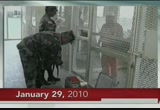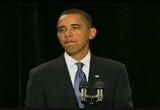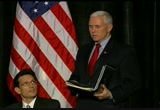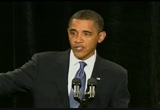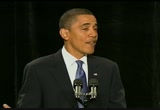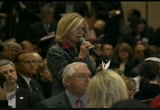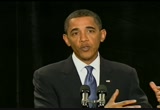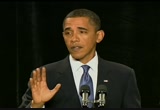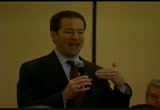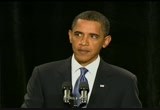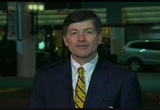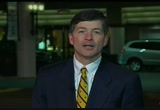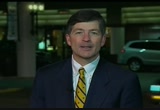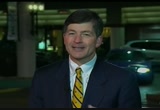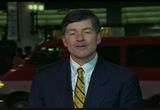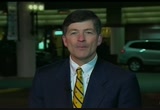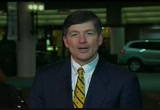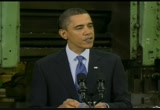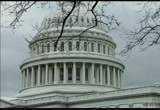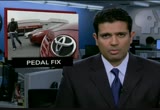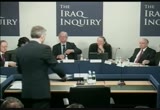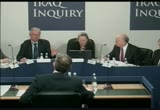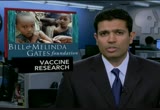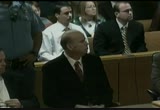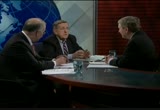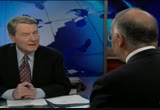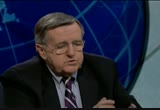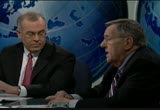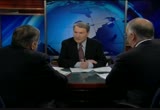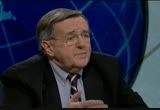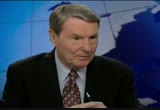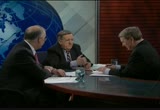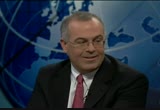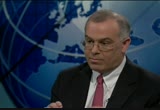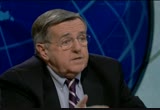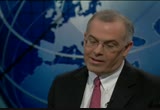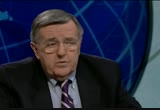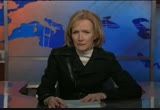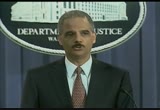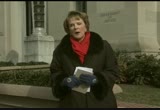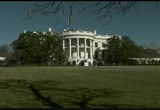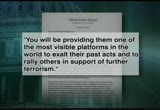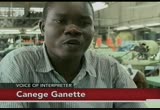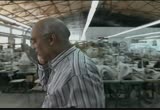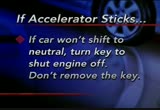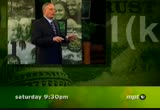tv PBS News Hour PBS January 29, 2010 6:00pm-7:00pm EST
6:00 pm
captioning sponsored by macneil/lehrer productions >> lehrer: good evening. i'm jim lehrer. the president took his "let's work together" message directly to the republicans today. >> woodruff: and i'm judy woodruff. on the newshour tonight, we'll have extended coverage of today's extraordinary meeting between the president and house republicans. >> the discussion that all of you just witnessed is a first. it was the kind of discussion that, frankly, we need to have more of. >> woodruff: and get the analysis of mark shields and david brooks. >> lehrer: then, the debate over where to hold trials of 9/11
6:01 pm
suspects. margaret warner reports. >> after a storm of protests, the white house has asked the justice department to scout out locations other than new york city to try 9/11 mastermind challid sheikh mohammed. >> woodruff: and in haiti, ray suarez looks at the prospects for a commercial revival there. >> lehrer: that's all ahead... on tonight's newshour. major funding for the pbs newshour is provided by:
6:02 pm
chevron. this is the power of human energy. grant thornton. the william and flora hewlett foundation, working to solve social and environmental problems at home and around the world. and with the ongoing support of these institutions and foundations. and... this program was made possible by the corporation for
6:03 pm
public broadcasting. and by contributions to your pbs station from viewers like you. thank you. >> lehrer: president obama went at it with house republicans today at a conference in baltimore. it was a rare no-holds-barred session between the chief executive and the opposition. we begin with excerpts. >> part of the reason i accepted your invitation to come here was because i wanted to speak with all of you, and not just to all of you. so i'm looking forward to taking your questions and having a real conversation in a few moments. and i hope the conversation we begin here doesn't end here, that we can continue our dialogue in the days ahead. >> i am optimistic, i know many of you individually. and the irony, i think, of our political climate right now is that compared to other countries, the differences between the two
6:04 pm
major parties on most issues is not as big as it's represented. but we've gotten caught up in the political game in a way that's just not helping. it's dividing our country in ways that are preventing us from meeting the challenge of the 1s century. i'm hopeful that the conversation we have today can help reverse that. so thank you very much. (applause) >> thank you. now i would like to open up for questions. >> now last year about the time you met with us, unemployment was 7.5% in this country. your administration and your party in congress told us that we'd have to borrow more than $700 billion to pay for a so-called stimulus bill that was a piece-meal list of projects and boutique tax cuts, all of which, we were told, had to be passed or unemployment
6:05 pm
would go to 8%, as your administration said. well, unemployment is 10% now, as you well know, mr. president. here in baltimore it is considerably higher. now republicans offered a stimulus bill at the same time. cost half as much as the democratic proposal in congress and using your economic analysts' models it would have created twice the jobs at half the cost. the first question i would pose to you very respectfully, mr. president , is, would you be willing to consider embracing the kind of across-the-board tax relief that republicans have advocated, that president kennedy advocated, that president reagan advocated and that has always been the means of stimulating broad-based economic growth? >> well, the... there was a lot packed into that question. (laughter) >> we can score political
6:06 pm
points on the basis of the fact that we underestimated how severe the job losses were going to be. but those job losses took place before any stimulus, whether it was the ones that you guys proposed or the ones that we proposed, could have ever taken into effect. the package that we put together at the beginning of the year, the truth is, should have reflected... and i believe reflect wad what most of you would say are common sense things. this notion that this was a radical package is just not true. a third of them were tax cuts and they weren't-- when you say they were boutique tax cuts, mike, 95% of working americans got tax cuts. and the notion that i would somehow resist doing something that cost half as much but would produce twice as many jobs, why would i
6:07 pm
resist that . i wouldn't. that's my point. is that i am not an idea loll-- idealogue i'm not. it doesn't make sense if somebody could tell me, you could do this cheaper, and get increased results then i would say great. the problem is, i couldn't find credible economists who would back up the claims that you just made. >> marcia blackburn, tennessee. >> thank you, mr. president. and thank you for acknowledging that we have ideas on health care. because indeed we do have ideas. we've got plans to lower costs, to change purchasing models, address medical liability, insurance accountability, chronic and preexisting conditions and access to affordable care for those with those conditions. insurance portability,
6:08 pm
expanded access but not doing it with creating more government, more bureaucracy, and more cost for the american taxpayer, so my question to you is when will we look forward to starting anew and sitting down with you to put all of these ideas on the table, to look at these lessons learned, to benefit from that experience, and to produce a product that is going to reduce government interference, reduce cost, and be fair to the american taxpayer. >> if you look at the basic proposal that we put forward, that has an exchange so that businesses and the self-employed can buy into a pool and can get bargaining power the same way big companies do, the insurance reforms that i've already
6:09 pm
discussed, making sure that there's choice and competition for those who don't have health insurance. the component parts of this thing are pretty similar to what howard baker, bob dole, and tom dashem-- daschle proposed at the beginning of this debate last year. now may not agree with bob dole and howard baker and certainly you don't agree with tom daschle on much, but that's not a radical bunch. but if you were to listen to the debate, and frankly how some of you went after this bill, you'd think that this thing was some bolshevik plot. i means that's how you guy guys... that's how you guys presented it. and so i am i thising to myself, well, how is it that a plan that is pretty
6:10 pm
centrist ... no, look, i mean i'm just saying, i know you guys disagree. but if you look at the facts of this bill , most independent observers would say this is actually what many republicans... it is similar to what many republicans proposed to bill clinton when he was doing his debate on health care. so all all i'm saying is we've got to close the gap a little bit between the rhetoric and the reality. >> mr. president, i heard echoes today of the state senator that i served with in springfield. and there was an attribute and a characteristic that you had that i think served you well there. one of the keys was you rolled your sleeves up, you worked with the other party, and ultimately you were able to make the deal. now here's an observation.
6:11 pm
over the past year, in my view, that attribute hasn't been in full bloom. and by that i mean you've gotten this subtext of house republicans that sincerely want to come and be a part of this national conversation towards solutions. but they have really been stiff-armed by speaker pelosi. now i know you're not in charge of that chamber. but there really is this dynamic of, frankly, being shut out. so here's the question. moving forward i think all of us want to hit the reset button on 2009. how do we move forward? >> we've got to be careful about what we say about each other sometimes. because it boxes us in in ways that makes it difficult for us to work together. because our constituents start believing us. they don't know sometimes this is just politics what you guys, you know, or folks on my side do sometimes.
6:12 pm
so just a tone of civility instead of slash and burn would be helpful. thank you everybody. god bless the united states of america. thank you, everybody. (applause) >> woodruff: now, more on the president's appearance before house republicans-- someone who was there for it all, texas representative jeb hensarling. congressman hensarling, thanks for being with us and for standing out in the cold. what did you take away from this unusual session? >> well, you're right, judy, it was an unusual session. listen, the president deserves great credit for accepting our invitation. i'm glad that he did it. i'm hoping something good will come out of it. we've never seen any kind of outreach from speaker pelosi to attempt to work on a bipartisan basis. i hope we see one out of the president. there are some areas maybe we can work on. but i got to tell you, the american people want accountability in government. and regardless of whether you are a republican or
6:13 pm
democrat today i think was at least a chapter in accountability. i mean things like the louisiana purchase and the cornhusker kickback, people want to see some accountability. they saw it today. >> woodruff: you asked him a question about the budget he's going to submit next week. and he took issue with your characterization of how the deficit has gotten to where it is . did you change your perception after you heard what he said? >> well, no. i mean i listened. i still like and admire our president. don't know how much he likes me. facts are pesky things. and the fact is a year ago he proposed a budget that was going to almost triple the national debt in ten years. he proposed a budget that over ten years would increase government from roughly 20% of our economy to 24.5. and i asked him was he going to present this in the next budget. unfortunately, the president chose not to answer the question. he questioned me on some of my facts.
6:14 pm
i stand by my facts. they're posted on my web site. anybody can see them. >> woodruff: well, he did challenge you, you're right. he went back and described how he had inherited a lot of this deficit. but without getting into that, what about this point that he made on health care. that this plan, in his view, was really he said a pretty centrist plan. that bob dole, howard baker were for something like this a year ago. he said in effect, you had republicans calling it a bolshevik plot. >> well, i think the president used a little overheated rhetoric there. i just don't believe people in america believe this is a centrist plan. i think if you do any kind of honest budget accounting, you would have to say it's closer to a $2 trillion plan. i think ultimately you have government defining cost. you have government defining benefits. it's just not a centrist plan. and in some respects, after three elections in a row,
6:15 pm
it's pretty clear the american people don't believe it. with all due respect to the president. now listen, i agree with the president. we still need health-care reform but the american people are mainly concerned. can we make it affordable. can we make it portable. republicans have put a plan on the table that would help do that. hopefully we can work with the president. we certainly haven't been able to work with the speaker, and work out a few of these solutions. >> well, the president said he has taken on board a number of republican ideas. and he kicked off what they are. in the health-care plan and in the stimulus package. last year. do you -- >> number one, judy, i respectfully disagree with some of the president's characterization. number one, you'll find nothing in there of any substance having to do with liability reform, medical liability reform. he said his people say one to two percent. frankly most of the studies i say say 8 to 10%. as far as any kind of effective means to buy
6:16 pm
health insurance across statelines, again with all due respect, i don't quite see it in the president's plan. not to say that he's totally wrong. there are a landful of ideas. but at its core essence it is a huge, expensive, draconian package that has government taking over a huge portion. and people just don't consider it centrist. >> woodruff: what about his point, congressman, essentially that republicans have to understand that neither side can get 100 percent or even 80% of what they want there has to be give on both sides. he was really saying republicans haven't been prepared to give anything. >> well, judy w all due respect, we haven't had an opportunity because we haven't been invite mood the negotiations i'm the second ranking republican, the second most senior republican on the house budget committee. i can assure you i have been brought in on all of the negotiations of the $2 trillion health-care plan. wasn't brought in so any of the negotiations on the budget. listen the president is
6:17 pm
right but i'm afraid that many on his side of the aisle believe that bipartisanship is here's our legislation. and if you don't vote for it, then you're against it. i think one thing that came out today whether people disagree with the republicans, they know we put forth alternative plans and that was on display for the american people. >> woodruff: did you believe him when he said at one point i'm not an idealogue and his whole point that he said i want to work with you. >> well, listen, we want to work with the president. again, i give him more credit than the speaker who hasn't shown any notion to work with us am i'm not going to criticize the president. clearly he has strong philosophical beliefs as do we. but hopefully trillion's be some common ground. but again facts are facts and we still have a budget plan that he submitted on the table, i hope, i hope next week we'll see something different. but we are downing in debt and deficit. we had a $1.2 trillion estimate plus plan and
6:18 pm
unfortunately we're style mired in double-digit unemployment. those are pesky facts. i hope the president will realize that ultimately that's not the way to create jobs. i'm heartened to hear some of the things he has to say about small business tax relief. willing to sit down, hopeful, hopeful we can sit down at the table and empower those small businesspeople who are truly the job engine in america. >> woodruff: so finally where do you see potential areas where you can work with the president? >> well, i think i just mentioned one and that has to do with tax relief for small businesses. always the devil's in the details. i would like to see that. the president has state of the union mentioned he would like to see free-trade agreements passed. i think those will create jobs. i think republicans will work with him on that. but we're not going to work with him on the nationalization of the health-care system. we're not going to work with him to plunge the nation in to deeper debt. but on items where there is some common ground, this isn't about saying no.
6:19 pm
this is finding common ground to help create jobs in america and insurance we don't leave unconscionable immore ral debt upon our children and grandchildren. >> representative japanese yen hensarling of texas, we thank you very much. >> thank you. >> lehrer: we'll talk to shields and brooks about the meeting right after the other news of the day. and for that, we go to hari sreenivasan in our newsroom. >> sreenivasan: u.s. economic growth at the end of 2009 was the best in six years. newshour correspondent kwame holman has that story. >> holman: the latest on the economy came shortly before the president left for a day trip to baltimore to talk up job creation. the commerce department reported the gross domestic product grew at an annual rate of 5.7% in the fourth quarter of last year. it marked the second quarter of growth in a row. >> just to give you a sense of perspective there, that's the fastest economic growth in six years, and it's a stark
6:20 pm
improvement over the rapid and terrible decline that we were experiencing one year ago. >> holman: the president welcomed the news as he toured the chesapeake machine company in baltimore. but he warned again that tough times are a long way from over. >> even though the storms of the past two years are starting to lessen, the wreckage that's been left behind remains. while the recovery act has created and saved two million jobs, this recession has cost us seven million jobs. so there's still a big gap, still a big hole that we have to fill. >> holman: indeed, 10% of americans still are out of work, a level not expected to recede before the end of the year. and slow consumer spending still could cause the economy to weaken again. in response, the president called for $33 billion in tax credits for small firms that hire new employees. he previewed the plan in his state of union address. democratic leaders in congress
6:21 pm
have signaled they already are moving on a jobs bill. senate democrats said they'll have a plan by next week. and house majority leader steny hoyer said his chamber could act quickly as well. in the meantime, the president reviewed the situation late today with his embattled treasury secretary, timothy geithner. he's come under growingcluding a contentious congressional hearing this week. >> sreenivasan: stocks fell today, despite the report of surging growth in the fourth quarter. wall street focused more on signs the surge may be short- lived. the dow jones industrial average lost 53 points to close at 10,067. the nasdaq fell more than 31 points to close at 2,147. overall, this was the market's worst month since last february. the dow ended with a loss of 3.5%. the nasdaq fell more than 5%. toyota moved today to begin fixing a gas pedal problem that has forced it to stop selling most models in the u.s. the pedals can stick, forcing
6:22 pm
the car to accelerate out of control. the associated press reported new parts are being sent first to factories. the problem affects about 4.2 million vehicles in north america, europe and china. toyota is a newshour funder. three more americans have been killed in afghanistan. that makes 29 this month. a nato announcement today said the latest fatalities were two u.s. troops and one civilian. there were no details on how they died. six taliban fighters were killed in a seven-hour shootout in the southern city of lashkar gah. militants occupied a vacant building near an army barracks and machine-gunned government offices. it was similar to an assault in kabul two weeks ago. in britain today, former prime minister tony blair made his long-awaited appearance before a british commission investigating the iraq war. >> blair lied, thousands died. >> sreenivasan: blair had to avoid more than 150 protesters outside a london convention hall and chants of "jail tony!" and "blair lied, thousands died."
6:23 pm
but once he took his seat inside, blair defended his decision to have britain join the u.s. in the 2003 invasion of iraq. >> the primary consideration for me was to send an absolutely powerful, clear and unremitting message that, after september the 11th, if you were a regime engaged in w.m.d., you had to stop. >> sreenivasan: indeed, the former prime minister said there were strong fears that saddam hussein already had, or was working hard to obtain, chemical, biological or even nuclear weapons. >> so far as understanding the decision i took and, frankly, would take again-- if there was any possibility that he could develop weapons of mass destruction, we should stop him. that was my view. that was my view then, that is my view now. >> sreenivasan: the five member
6:24 pm
panel pressed blair on exactly when he offered to support then- president bush in the invasion of iraq. previous witnesses had claimed it was in 2002, more than a year before parliament approved military action. >> do you think you gave him any commitments? >> the only commitment i gave, and i gave this very openly at the meeting, was a commitment to deal with saddam. now, we can deal with it... >> so you were at one that you had to deal with...? >> absolutely, and that wasn't a private commitment, that was a public commitment. >> so you were agreed on the end, but not on the means? >> reporter: the former leader acknowledged some errors, but it wasn't enough for relatives of some of the british troops killed in iraq. >> i'm really disgusted in him, the way that he spoke. >> i'd go as far as saying he's a traitor to his, he's a traitor to his country, to his soldiers. and he won't be brought to justice. he's not, you know, he's not going to pay for it. >> sreenivasan: this is britain's third investigation into the iraq war, which resulted in the deaths of 179 british troops. the british withdrew from iraq last year. the bill and melinda gates foundation will donate $10
quote
6:25 pm
6:26 pm
6:27 pm
civil way without any rancor. i just thought it was a tour de force. and the republicans are sort of hoisted on their transparency pitard. they had criticized the president for not fulfilling his pledge of openness and transparency and having the hearings and c-span as promised during the campaign. and so they were stuck with being open. they didn't want it to be televised, that q&a part. >> lehrer: it was. >> i think was there and the think the president engaged them in a way that you can't in the state of the union when they just sit there, stole i hadly and silently. you got a sense of comparison today and i think worked to barack obama's advantage. >> lehrer: do you agree, worked to his advantage. >> i bit. everyone was sort of charged up about it. all of washington is actually very excited about it. people were thrilled. i mean, and democrats were very thrilled. the president's naturally going to dominate an event like that. he's got the podium. they are just holding handhelds. but republicans were thrilled too. i spoke to a bunch of republicans who were there
6:28 pm
afterwards and people who are-- . >> lehrer: what did they say. >> they were happy. they said he said all along we don't have plans but over and over again he acknowledged yeah, we do have alternatives, we've been offering them. so they acknowledged that he got most of the time, he did very well. but they were thrilled that they got some points across. and they were thrilled by the exchange. and i think americans will be thrilled by the exchange, to the extent they see it and will it lead to a mass depolarization, not exactly, obviously. and you know, there are fundamental differences on manys like health care there are just different approaches. but i think one of the things the president did very well is list a whole series of things on which there is not necessarily differences. things like-- . >> lehrer: he made a point of that. >> legislation, spending freeze, a lot of the cuts in the capital gains tax, there is no reason there can't be some agreement on that stuff. so i thought it's possible to see going forward on some of the job creation stuff. you could see some bipartisanship. >> lehrer: do you see, that something like that could come. >> i think there will be on certain selected issues, but there is really no incentive
6:29 pm
for the republicans to be bipartisan. and i mean just look at where the republicans werement they went through two singing election defeats. they lost 52 seats in the house in the two elections back-to-back, 2006, 2080. and the party right now today is at a lower point in public affection and regard than it was in 2006 and 2008. okay. >> lehrer: when they lost. >> when they lost those seats. it's a party without a compelling voice, national voice, a leader. or a face. i mean to say who's the leader of the republican party. and yet at the same time, they are tied with the democrats who had trounced them in the two previous elections. so what is the incentive politically going into 2010 for them to be collegial all of a sudden. what they have done so far has gotten them to the point where they are at a parity. they're not beloved, nor are the democrats.
6:30 pm
they're far more poorly regard than the democrats in the polls. but they are at a parity and they are poised to have quite an election year. >> do you see it they don't have any incentive, political incentive to make a deal. >> they certainly have none. they're riding high. you look at the polls. we know what happened to massachusetts but if you look at state after state where the senate races in pennsylvania, in ohio, in illinois, in missouri, you have seen the same trend in the poll lines. the republicans are shooting upwards, now even in pennsylvania the republican has a significant lead over the democrats there. so they have no incentive to change things. so when i'm talk about depolarization, some cooperation, it is on little stuff having to do with job creation and growthment but certainly it's not on the big thing. and the big thing is the size of the government. that's clearly the core issue. republicans are very comfortable where they are. and obama has to do, make a tricky argument which is you hate washington, you distrust washington but here we're in washington. we want to do these programs and that is a trickier argument. >> what about the president.
6:31 pm
of course he started it in the very directly in the state of the union address wednesday night. he pick approximated up on it today. he scolded them as well. i mean it wasn't all hey, let's all work together. he took them on. using tough words. >> i think the president, david and i do disagree on whether it is left or right or big or small. i think it has to be showed that government works. and i thought his rebuttal response to congressman mike pences question about the unemployment, and he pointed out that there are 650,000 people laid off and lost their job in december 2008, 750,000 in january, another 650,000 in february, before his plan kicked in. and that economists now, and he has to make the case which i think has been very poorly made that government does and has made a difference whether it's in-- . >> lehrer: you mean the stimulus package. >> the stimulus package and his other initiatives. because you can't be the anti-government candidate wile are you the president of the united states. ronald reagan managed to do it for eight years. >> lehrer: it is hard.
6:32 pm
>> it is a very, very difficult. and he was still talking about the puzzle-- on the potomac where his own people were running it. so i do think that the president you know quite honestly has to do that. and the scolding part, he makes a good argument and it's true to democrats as well as republicans. and that when you and i are on the different side of an issue and you say to me, mark, you're wrong on this, i think your facts are incorrect. and maybe if i agree with you or disagree with you, that doesn't preclude our working together in the futurement but if i say to you, jim, you're immoral on this, you are unamerican. you don't care about widows and orphans. you don't care about the country or the economy. then i have put a gulf between us, a demonized you in a way that preinclude-- prechruteds our working together in the future. and i think that has been, quite honestly, much of the criticism has been that personal and that demonizing. >> do you think this could change that. i mean not some of, maybe
6:33 pm
not lead to a lot of, you know, let's go march and legislate together but at least the rhetoric might change? >> maybe, marginally. i wouldn't think so it is partly that. and pretty nasty things were said against president bush. it's partly what a lot of the house members were saying today which is it's fine for president obama to talk about these things. but if you are sitting in the budget committee or appropriations committee,nd are you in the minority you have no job. you have no say. and that was true when the republicans were in control. and that are the habits that have been conducted in. and president obama does not control nancy pelosi. and the house has just become structured like that. the senate is increasingly structured like that and that's where a lot of the resentments, the feelings of being ignored. >> do you think that president obama could do something about it, has no influence on what happens in the house. >> well, i think the president could do something about it. but it is, you know, the way you get promoted in the congress is fund-raising. and those people are partisan. and that's how leadership works.
6:34 pm
>> i think it's a lot tougher to be excoriating in speech or condemning in speech when are you sitting across the table from somebody. i really do. i think that the president can do that by more often with a personal exchanges. it's embarrassing then having talked to you and chatted with you than to stand up and denounce your net worth. a great republican speaker of the house joe canon early in the 20th sent resaid the minority has a responsibility and that's to help constitute a quorum. and that's been the rule of the house for a long time. >> one thing that could help, i think people if they met members of the house and the senate would be astonished at how little they know about each other across party lines. just personally. >> they don't associate. >> with what they are talking about in their offices or in their caucuses, they know nothing. frankly gi interview people on each side and sometimes you feel like you should be the diplomat, actually they are saying this. are you wrong about that. they are saying --
6:35 pm
>> shuttle diplomacy. >> and the effective legislators are the one was do. i mean the one was do -- >> it has always been true, has it not? >> yeah. how does the state of union address. >> i still think it was a good speech, a good speech for president oa. i guess where my second thoughts are it didn't go far enough. and look at where the country is. and historically unprecedented discussed at washington. to me shoot is not left, right, it's in, out. and the president did step away from the mess in washington and the failure to get anything done. he stepped away, to some degree by proposing policies that are not orthodox democratic by scolding people about the way they behalf. but i don't think he steped away far enough. i wish he had gone a little farther. say i got two suggested into washington, i'm really pulling back and doing something radical. because if the failure of health-care reform and all the stuff of last year didn't radicalize them, i don't know what will. so in secretary thought i
6:36 pm
wish he had gone further especially on the issue of the deficit which is the symbolic issue in the country's minds that if they can't even take care of the long-term fiscal situation, that's a sign 6 seven dull against and corruption and we have to take care of that issue. and i wish he had gone further to catch up to where the country is. >> what about the speech. >> i agree with david on the deficit. i mean he should have made a bigger deal. >> the deficit h is the figure that just absolutely blew me away. the deficit of the united states is bigger than the budget, the total budget of all the countries in the world except japan and ger-- united kingdom. other than that, every other country has a smaller budget than we have a deficit. china, india, germany, any of the overs, do i think the president didn't go far enough? the democrats are the party government. the republicans are the party of nongovernment, i mean, okay. so when government sun popular. >> lehrer: you mean in taerm
6:37 pm
terms belief. >> democrats believe the government can be an instrument for social justice for economic progress. and i think the president cannot distance himself from that. in fact, i think when he talks, it's great to be out of washington, be away from washington and all that, i think he has to make the case that public service is important. that the public mission, that the difference whether 90% of the kids in this country go to public stools. -- schools. that is why our business, is the public's business. i really think that is it. it is a tough slog but that is what he those do. >> how do you read ben bernanke's confirmation vote. only got 70 votes and 30 against him. >> right, i have said on this program we interview people and sometimes you interview somebody who tremendously impresses you. and person bernanke is tremendously impressive. so i personally was happy. he was reconfirmed. why was it not unanimous. part of it, you know, he has
6:38 pm
made mistake like anybody in this kind of circumstances. but frankly a lot of it was this was an easy shot at wall street. and there were several populist moves, okay, i'm not going to use that word. there were several words, several moves this week. >> lehrer: they're available on-line. >> by people who want to take a shot at wall street or who just want to appear popular and one of them was voting against the budget commission which seven republicans voted against even though they cosponsored the legislation. and one of them was voting for ben bernanke. and because they were easy, popular moves. >> is the-- . >> lehrer: is the secretary of the treasury geithner now in that same kind of target, essentially same brand of target that bernanke was? >> sheldon white house the senator from rhode island i thought put it quite well. he said bernanke as a february of the fed leadership wasn't particularly gooden forcing the fire code.
6:39 pm
but once the fire broke out, he was terrific at putting it out. and i think people are still angry at why the fire happened. and i think that anger that we saw it this week in the house oversight committee. >> lehrer: they will pete up on geithner. >> they did, and hank paulson, the former secretary of the treasury. in a sense, we don't know what happened. i mean we do know that aig got 85 billion dollars and then the companies that had bet on them and taken this crazy bet were reimbursed 100 percent. they didn't take a haircut or anything. and we don't know how it happened but we know the people who did it are prospering, walked away, and are untouched. so i think there is an anger that is still looking for a target. >> we do know one thing that happened. we just ran out of time. thank you both very much. >> woodruff: now, the debate
6:40 pm
over where to hold the trials of suspects accused of masterminding the terror attacks on the world trade center and the pentagon. margaret warner has our report. >> there are places that would be less expensive for the taxpayers, and less disruptive for new york city. >> warner: in a sharp reversal, mayor michael bloomberg spoke out this week against holding the trial of khalid sheikh mohammed, the alleged leader of the 9/11 conspiracy, in lower manhattan. >> it would be phenomenally expensive, and it is very disruptive to people who live in the area and businesses in the area, so that the economic impact is detrimental. and nobody knows how big. and it would be better to do it elsewhere, if they could find a venue. >> warner: the trial for mohammed and four of his co- conspirators was scheduled to take place here at a federal courthouse just blocks from where the world trade center once stood.
6:41 pm
that announcement was made in november by u.s. attorney general eric holder. >> they will be brought to new york, to new york, to answer for their alleged crimes... >> warner: that same day, he told the "newshour" he was confident the city was prepared. >> new york has also done a number of these trials in the past, has a track record for doing ese high-profile terrorist trials. >> lehrer: but you coped with the thought of your decision creating a big red bull's-eye for every terrorist in the world? >> i talked to mayor bloomberg. i talked to governor paterson. and mayor bloomberg especially said, "you know, this is the place where this case ought to be brought. we can handle it." >> warner: but estimates of the costs have grown into hundreds of millions of dollars for security and lost revenue for businesses. and fears about a possible attack have grown as well. now, new york state's senior democratic senator chuck schumer has changed his mind, too. >> i called the white house and told them that i thought it would be a very good idea that
6:42 pm
they look for alternative sites. >> warner: by today, it was widely reported the obama administration is considering moving the trial. the white house has asked the justice department to find alternative sites near new york city. but a white house spokesman said the president remains committed to holding the trial in federal court. in fact, a number of influential lawmakers in washington originally supported holding the trial in new york, including senator dianne feinstein, who chairs the senate intelligence committee. >> and i happen to believe that new york city is able to handle this in a very professional and definitively legal manner. >> warner: but the attempt to blow up an airliner over detroit on christmas day raised new fears. and senator feinstein told nbc news yesterday: the administration also faces
6:43 pm
increasing pressure to try all terror suspects before military commissions instead. republican congressman peter king of new york has introduced a bill to bar use of justice department funds for trying guantanamo detainees in federal courts. king's fellow republican, mike pence of indiana, said today some democrats may join republicans at least in blocking funding for holding the 9/11- related trials in new york city. >> this is a terrible idea to return the mastermind of 9/11 to the scene of the worst terrorist attack in american history. not only financial cost, but the emotional cost. and frankly, it compromises the security of that city by making it a terrorist target. >> warner: in addition, six senators-- both republican and democrat-- sent a letter to attorney general holder earlier this week urging a new site for the 9/11 suspects' trials. it read:
6:44 pm
"you will be providing them one of the most visible platforms in the world to exalt their past acts and to rally others in support of further terrorism." >> warner: meanwhile on the streets of new york today, there was still a fierce debate about whether to host the trial. >> i think it's new york. nobody really cares, you know. it's just that people will be disgruntled a little about the security barriers and that kind of stuff. but i think as long as they get passed it, it is a regular day as usual. >> i feel a bit scared for the fact that they going to be here in the states. we're living here. already what happened, 9/11, i just don't want that to happen again. you know, i think they should be in the military. i think he should be tried out there, more safer, more security, tighter security. >> warner: still, mayor bloomberg said today, if there are no alternatives, new york city will go through with it. >> it's not my job to tell them what kind of a trial. i'm not a legal expert, in any case. but, you know, if called on, we'll help them. i will say, they understand and
6:45 pm
they're trying to do something. it's just there are no easy answers to any of this. >> warner: in the meantime, the mayor of newburgh, new york, 60 miles north of manhattan, volunteered his city. he said it would benefit from the attention and possible federal aid. there have also been suggestions the trial could be held on an unpopulated island near manhattan, or at a nearby military installation. for now, there is no indication of when the 9/11 prosecution will begin, wherever it is held. >> lehrer: and finally tonight, more on the haiti earthquake. ray suarez has been reporting from there all week. tonight, he looks at rebuilding haitian businesses and the economy. >> suarez: the realities of the port-au-prince economy are brutally simple-- hundreds of thousands of workers have had no wages for weeks; the banks are
6:46 pm
mostly closed; the wire transfer businesses can't give haitians money wired in from abroad fast enough. this is uncomfortably close to a cashless city, which is why this was such a welcome sight: factories, getting ready to open for the first time since the quake, threw open the gates, and workers anxious for salaries poured in. 28,000 workers generate 10% of the country's entire g.d.p. even at five dollars a day, these jobs are highly prized. so what are we making? >> uniforms. >> suarez: charles baker's factory makes lab coats, surgical scrubs, food service whites, and uniforms, mostly for export to north america. he says his workers started filtering back to the factory from damaged neighborhoods last week. they wanted to get back to cutting, sewing, and packing >> what they need right now is what's happening on the other
6:47 pm
side. they're back at work. i would say 90% of them lost their homes, are sleeping outside. and for them, this is home. >> suarez: of his 750 workers, baker doesn't think any were killed. most factory workers survived because they were still at the job when the quake hit. but many have endured losses. >> he lost his 20-year-old son, a university student. >> he died sitting up, a piece of cement fell on him with his bag right by him and everything. lots of kids died. teachers died. so my child died. but i'm not discouraged. because god gave me strength. i still have life . this mechanic still has his home though it's damage. his sister died january 12th many at this factory lost someone but he says he had to get back to work.
6:48 pm
>> we cannot just sit there and to the do anything. for me it's preferable that we come to work so we can see each other and provide support for one another. >> suarez: baker's worldwide apparel cant get back to full production until his second building gets some repairs and reinforcement after earthquake damage. he's less sure about getting what clothing he can produce out through the country's damaged ports. pacific sports is putting its stock on the road for shipment through the dominican republic. the company could get even more product out if the cargo planes bringing all the aid from the u.s., instead of flying back empty, headed back loaded with haitian-made clothing. georges sassine is trying to get around haitian customs authorities he says are gumming up an easy solution to a tough problem. he's president of the association of haitian industries. his own factory is too damaged to resume production; repairs are underway.
6:49 pm
>> and find some other place to put my office. but we can do it, no problem. >> suarez: but fixing up his factory is going to take longer than he first thought. meanwhile, his machines are silent and his workers idled. normally, they turn out workout apparel for russell athletic and new balance sold at large u.s. retailers. but what if those stores turn elsewhere? >> it's nothing personal, it's not like these people are heartless, it's just business. the shelf is going to be empty; it cannot be empty. so they will have to make that decision. we don't want them facing that decision. we just want them back online so that that shelf is occupied by these same people. >> suarez: sassine was profiled on the newshour just before the earthquake. we broadcast a report on how the economy here was finally looking
6:50 pm
up. >> i have to be like a dispatcher-- investors from brazil, from ireland, and from korea coming one after the other. so it's been very hectic, believe me. but it's a good problem to have. >> suarez: and sassine saw better times ahead. now, he scrambles to help his members reopen, and uses his influence to get things done. on this morning, he's helping road crews assigned to demolition duty in the quake rubble who now have sadder duties thrust upon them. >> i'm here to pick up more body bags. >> suarez: the crews are still finding victims as they clear building sites. he's trying to hustle up aid for his workers, and losing big money every day his factory doesn't sew a single garment. while industrialists struggle to get exports to america, poorer haitians are waiting for wealth to flow out of america. haitians rely on relatives abroad for financial help,
6:51 pm
making remittances the country's single largest source of income. but now, when those dollars wired from worried family are most critical, people cant get their money. the cash transfer businesses were destroyed along with everything else pierre marie orlean had been in line since 5:00 a.m., waiting to get a transfer. >> ( translated ): we don't have anything since the earthquake. our house fell down. we don't have any food, we don't have anything. >> suarez: with so many jobs simply gone and sources of cash blocked, countless haitians are forced to rely on each other, as they do in the tent cities that have sprouted up around port-au- prince; and on foreign aid. when rumors spread through a crowd waiting outside factory gates for work that aid was being given out a nearby warehouse, hundreds rushed the truck and the gates to see if they could get any.
6:52 pm
>> the rest rush forward looking for an equal or a better haul but the gates close. haitian police and peruvian peacekeepers might have gotten the crowd's hopes up by having them get in line. they were just using the gesture as crowd control. and everything else is running out, it seems, there's still enough patience. >> lehrer: again, the major developments of the day: president obama addressed house republicans in a rare no-holds- barred exchange. the president said they had made his health care plan out to be "some bolshevik plot". the republicans charged he's ignored their ideas. and the government reported economic growth at the end of 2009 was the strongest in six years. but stocks sold off again on concerns about how strong the
6:53 pm
recovery will be. the newshour is always online. hari sreenivasan, in our newsroom, previews what's there. hari. >> sreenivasan: you can pose questions about the economy and a potential recovery to economics correspondent paul solman on his "making sense" page. and we catch up with jeffrey brown, who is at the sundance film festival, where he's a juror on the documentary review panel. all that and more is on our web site, newshour.pbs.org. judy. >> woodruff: before we go, an editor's note about the toyota recall story we aired last night. we received letters from viewers asking for more information about what to do if the accelerator sticks while driving. here's a fuller explanation, as recommended by toyota: to stop immediately, step on the brake pedal with both feet and apply steady pressure. don't pump the brake. shift the gear into neutral while pressing the brake to make a controlled stop, then turn off the engine. if the car won't shift into
6:54 pm
neutral, shut the engine off by turning the key, but don't remove the key. doing this will disable power brakes and steering, but toyota says that manual steering and braking control can still be maintained by the driver. if the car uses a button for ignition, press the button steadily for at least three seconds to turn the engine off. for the record, toyota is a newshour underwriter. that's the newshour for tonight. i'm judy woodruff. >> lehrer: and i'm jim lehrer. "washington week" can be seen later this evening on most pbs stations. we'll see you online, and again here monday evening. have a nice weekend. thank you and good night. major funding for the pbs newshour is provided by: >> what the world needs now is energy. the energy to get the economy humming again. the energy to tackle challenges like climate change.
6:55 pm
what if that energy came from an energy company? every day, chevron invests $62 million in people, in ideas-- seeking, teaching, building. fueling growth around the world to move us all ahead. this is the power of human energy. chevron. >> this is the engine that connects abundant grain from the american heartland to haran's best selling whole wheat, while keeping 60 billion pounds of carbon out of the atmosphere every year. bnsf, the engine that connects us. pacific life. and by grant thornton. and the national science foundation. supporting education and research across all fields of science and engineering.
6:56 pm
and with the ongoing support of these institutions and foundations. and... this program was made possible by the corporation for public broadcasting. and by contributions to your pbs station from viewers like you. thank you. captioning sponsored by macneil/lehrer productions captioned by media access group at wgbh access.wgbh.org
2,360 Views
IN COLLECTIONS
WMPT (PBS) Television Archive
Television Archive  Television Archive News Search Service
Television Archive News Search Service 
Uploaded by TV Archive on

 Live Music Archive
Live Music Archive Librivox Free Audio
Librivox Free Audio Metropolitan Museum
Metropolitan Museum Cleveland Museum of Art
Cleveland Museum of Art Internet Arcade
Internet Arcade Console Living Room
Console Living Room Books to Borrow
Books to Borrow Open Library
Open Library TV News
TV News Understanding 9/11
Understanding 9/11
